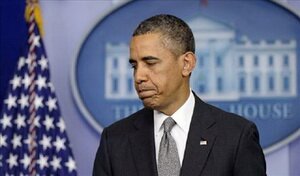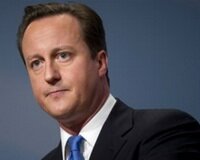
Night from Thursday to Friday, as expected, nothing happened. Rockets remained on launchers, aircrafts — on the ground.
There is every reason to believe that protraction of the decision to attack Syria is due to the reluctance of the main part of the western USA's allies in NATO to take responsibility for an unreasonable military operation. If it does begin, it will be the second war of the United States of America under the leadership of incumbent President Barack Obama. Besides, political goals of the operation, declared by Washington, cannot be achieved by military means available.
 |
| "What to do?" |
So far B. Obama has been silent and “about to” take a decision, which means only one thing —there is no decision. So far this Obama's silence can be interpreted as a painful search for a way out of the Syrian impasse with minimal losses. Or rather, there is a partial solution — not to consider the possibility of determining the free-fly zone over Syria, similar to the one that had been determined over Libya on the eve of the overthrow of Muammar Gaddafi, as stated in the briefing on Thursday by Deputy Spokesperson of the US State Department Marie Harf.
The chemical attack in Eastern Ghouta also looks like an obvious provocation. London does not know who is responsible for the chemical attacks in Syria, said on Thursday the British Prime Minister David Cameron. “In fact, there is no absolute certainty as to who is responsible for the chemical attack. We have no evidence to suggest that the opposition has no chemical weapons, and the regime has one, and that they used chemical weapons, attacked… This is not enough for saying that the regime is responsible, and that it will be punished for this”, — he said. His statement shows that Britain will not participate in military actions against Syria before the final discussion of this question at the Security Council. Not only that — in case of failure of the majority of Security Council members, Britain's participation in the war together with the United States will be pointless.
 |
| British Prime Minister David Cameron during a debate in parliament assured lawmakers that London would not take military actions against Syria, until the UN inspectors on chemical weapons did not leave the country http://podrobnosti.ua/ |
At the same time, Cameron said that the humanitarian catastrophe in Syria gives grounds for international intervention into the current situation. The British Prime Minister assured of the need for a peace conference on Syria, “Geneva - 2”. “I phoned the U.S. President Barack Obama, then — the Russian President Vladimir Putin. Our positions are, of course, very different, but we agree on two items: we agree that it is necessary to start the Geneva process, and that if any actions are to be taken, they should be taken to speed up the political process “, said Cameron.
European countries are beginning to make statements about their attitude to participation in the “military retaliation”. In fact, other than France, no one is willing to fight, as they say, in any format.
Italy has made its position as clear as possible — it will not participate and will not support the war. Greece and Portugal have also spoken against the war.
 |
| The Iraqi government strongly rejects military intervention in Syria and condemns Western countries' threats to the CAP and its people http://telegrafist.org/ |
Arab countries are not unanimous against a possible strike on Syria either. Egypt is rigidly against the war, as Foreign Minister of the interim government, Nabil Fahmy stated to reporters last Thursday.
He was supported by Iraq. Prime Minister Maliki spoke adamantly against the use of Iraqi airspace to attack Syria. At this, the Iraqi army has already been brought to a state of full combat readiness. Of course, there is little it can decide on, however, in this case, it is the position of the leadership of the country that matters.
The rest of the countries have been temporizing. Their rulers are aware of the fact that participation in the West's war against an Arab country will be seen in the Arab world negatively. And if we take into account the possibility of Israel's joining the Western coalition, their participation would be deadly dangerous.

|
| A full-scale Israeli-Syrian war is not profitable for any of the parties to the conflict. For both, Israel and Syria, it would be a serious blow to national security, regardless of who would come out of it a winner http://m.expert.ru/ |
Israel's principled position is a most severe neutrality. Even during the attacks on targets in Syrian territory, Israel did not touch the government forces, focusing on targets like warehouses with arms and ammunition.
Tel Aviv, first of all is trying to solve its problems with the “Hezbollah”. It has come to the point that Israeli Prime Minister Benjamin Netanyahu quite officially banned the Cabinet of Ministers to mention the word “Syria“ in official speeches.
In Israel, Assad is not loved, but they are well aware that he is the only barrier against Sunni binge on the border with Israel. Having finished with Assad's regime, armed to the teeth with Western weapons, Islamist groups “will carry jihad“ on, and Israel will be the first at whom they will aim their weapon.
Ankara does not need to interfere into Syria's war either. Turks in addition to their problems with Kurds in the country least of all need problems with Syrians! The latter, by the way, openly support the Syrian president. Of course, Turkey may decide to take advantage of the situation and send troops and to annex a part of Syria. But the question arises — how to hold it afterwards? Besides, the deployment of troops in Syria would mean to Turkey throwing out of the window all its economic gains of recent years. Taking several billion from the budget and throwing them into the Syrian adventure is not what Ankara considers necessary. Especially because these costs will not be reimbursed by anyone.
The active player in the Gulf region — Islamic Republic of Iran — has expressed concern and urged the parties to exclusively diplomatic solution to the crisis.
 |
| Russia and China consider unwise the British proposal to the UN Security Council to adopt a resolution demanding to allow the UN Inspectors on Chemical Weapons to Syria http://newsradio.com.ua/ |
The position of China is also known: with Russia it has blocked a draft Security Council resolution, which proposes a forceful solution of the Syrian problem. Resolution has been sent back for revision, but it is clear that it will not be adopted. Washington is aware that the Chinese have a tool of pressure on the USA's position. Not long ago, worsening of relations between China and Japan, a key U.S. ally in the region of South- East Asia, coincided with a significantly increased threat of external intervention in the Syrian conflict, after which the United States limited their actions to the rhetoric in support of the Syrian opposition. The threat of indirect actions of China still exists, so, most likely, China will continue to formally stay out of the conflict, but influencing it.
The West expects that the threat of military intervention should significantly undermine positions of the Syrian government in future negotiations and force it to accept the West's conditions. What kind of conditions — is not clear yet, although in general one can guess. The key question is the power. It is the power that Assad should share with the opposition. The dream of the West is creation of a coalition government in which power structures will either be put under the control of the opposition, or shared with the authorities in any ratio.
In this “negotiation key”, the West is ready to communicate at the negotiation table even today. Perhaps the whole current media campaign has a quite pragmatic task: to suppress the will to resist and to compel to negotiate on the West's terms.
The rest so far is without changes. That is, there is no decision.
Western analysts believe that the indecision of the United States is connected with the bitter struggle between supporters and opponents of a military solution to the Syrian issue. And this bitterness indicates that the U.S. policy is at the inflection point, or at least very close to it. Old approaches are not working, while on the new ones there is no consensus.
The second reason for the USA's hesitations is connected with the inefficiency of the alleged military mission. Loss of reputation could nullify the temporary military success. Precision strikes cannot completely destroy or even critically weaken Assad's military capabilities, and the very first shot down American plane or hitting a civilian object with numerous civilian casualties would dramatically change public opinion.
Besides, with the election of a new president of Iran at stake are talks with Iran on the nuclear issue and their results. Attack at Syria, even if it is inevitable, must not disrupt them. This is the true “red line” which the American President does not dare to step over. Obama's opponents have masterfully brought him close to the war, and now he will have to do something. What exactly to do — guessing is completely useless. Events in the Middle East have come up closer to another turning point, and which direction the history of the region chooses — one can only guess.
The U.S. state machine has a lot of experience of getting out of crisis situations under a formula of “settling domestic problems through foreign policy actions”. However, in today's world globalized by the efforts of the United States themselves, this approach does not seem sensible. Syria has become a stumbling block for both domestic layouts in the United States and in international relations. Local conflicts are significantly closer to a global confrontation, to which none is ready. Neither morally, technically, militarily nor economically. It is already clear that on the hold of war are actively profiting only traders of oil, gold and raw materials.
Thus, around Syria have, in fact, been formed two opposing coalitions, although they are not issued legally. A classic pre-war situation — therefore, it is not easy for Obama to decide on the beginning of fighting. No one can predict what the consequences of direct intervention of one of the coalitions in the Syrian conflict will be. Under the circumstances, when the USA has largely lost control of the situation, any sudden movement can restore it as well as lead to the complete loss of positions.

|

|
| Syria — religions http://voprosik.net/ |
Syria — nationalities
http://voprosik.net/ |
What will happen if a military operation begins? Syria will cease to exist as a state. It will turn into the territory of chaos, where there will be a boiling cauldron of Alawite, Shia, Sunni, Wahhabi Christians — it's by religious and confessional lines. And there is also an ethnic aspect —Arabs, Druze, Armenians and Kurds. At this, Syria is not Iraq, where there was a certain ethno-confessional compactness. Here, everything is mixed, particularly in the west of the country. And in case of Syria's falling apart, in the region will arise “ethno-confessional meat grinder”.

